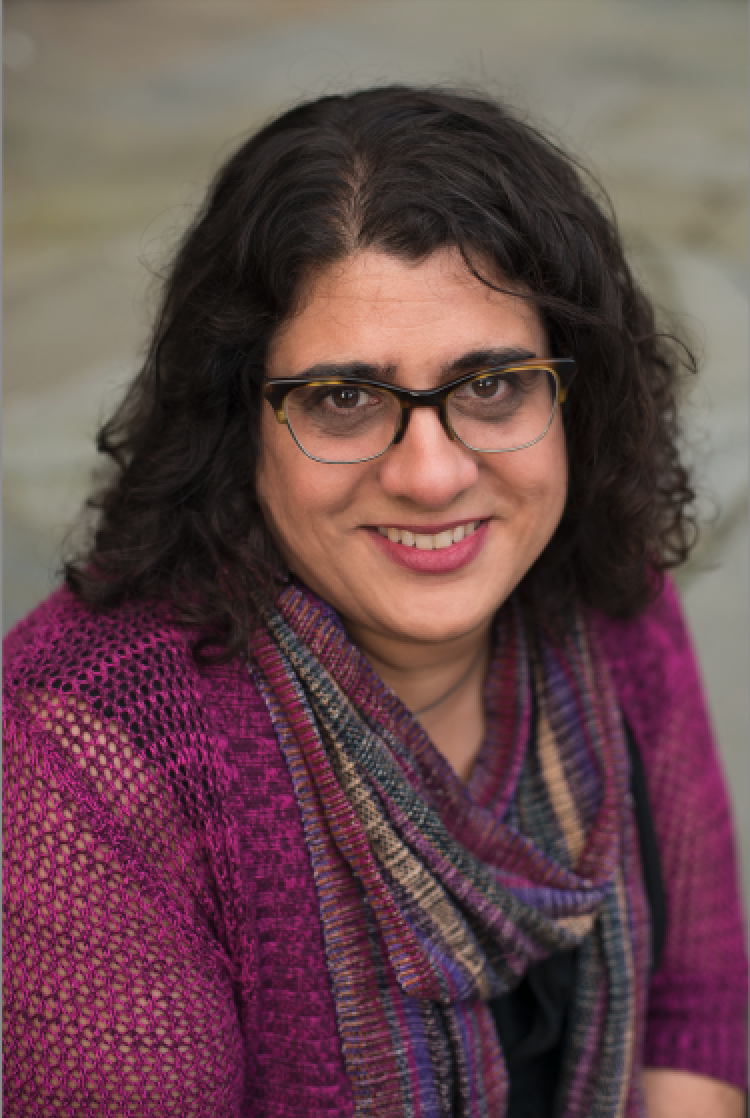In her recently published book, Samira Mehta offers insight into a lesser-known, but nevertheless hurtful, type of racism
It’s 2016, Pennsylvania, and Samira Mehta, 她后来成为了博彩平台推荐女性与性别研究的副教授和犹太研究项目的主任, is having dinner with an old friend.
He asks about her experiences during the election, as he, like many people, 对特朗普竞选激起的仇外情绪感到担忧. How’s that been for her?
Short answer: not great.
她的母亲是伊利诺斯州白人,父亲是印度人, 梅塔曾两次在当地的杂货店被人吐口水,并被勒令“回家”.(顺便说一下,我的家是康涅狄格州,梅塔在那里出生和长大.)

Samira K. Mehta, an associate professor and director, explores the intersectionality of religion, culture and gender, including US family politics.
Yet although such flagrant acts of racism are scary, Mehta tells her friend, they aren’t the kind of racism that really hurts her. 她说,真正伤害她的是“爱我的人的种族主义”.”
Now Mehta has published a book exploring this topic, 爱你的人的种族主义:博彩app推荐混合种族归属的论文, 这本书让博彩平台推荐亲眼看到了种族混杂带来的挑战,并鼓励人们讨论一种有时被忽视的种族主义, under-addressed or misunderstood.
梅塔说,通常,当博彩平台推荐想到种族主义时,博彩平台推荐会想到重大的历史时刻. 博彩平台推荐想到夏洛茨维尔的“团结右翼”集会, Virginia; about Los Angeles police officers brutally attacking Rodney King; about Rosa Parks being told to give up her seat on the Montgomery, Alabama, bus; about John Lewis being beaten on the Edmund Pettis Bridge in Selma, Alabama.
“更难谈论和思考的是在你爱另一个人,他们也爱你的关系中遇到的种族主义时刻,” says Mehta.
The racism of people who love you is a subtler, more elusive form of racism, Mehta explains, 这对混血儿来说尤其具有挑战性. Mehta herself has endured it on many occasions.
其中一个例子与2016年与她共进晚餐的朋友有关.
Years earlier, she was flying out to visit him, she recalls, “and I got searched really aggressively by TSA, and it was invasive. 我被拉出了队伍,不得不脱掉衣服,我很担心. And my friend was like, ‘If, by searching people who look like you, they keep everyone safe, this is just an inconvenience.’”
Another example involves Mehta’s maternal aunt. At a family get-together, Mehta was wearing Indian clothing, and so her aunt decided to ask her, “So, are you super ethnic now?”
梅塔的朋友和她的姨妈都不是故意种族歧视. 事实上,他们是那种强烈否认种族主义的人. “These are people for whom being liberal, or maybe even being progressive, is really central to their identity,” Mehta says.
然而,正是这个人是谁和他说什么之间的紧张关系,使得爱你的人的种族主义如此难以解决.
“和别人谈论这些事情真的很难, because to them they’re one-offs; to them they’re little things,” says Mehta. “他们不一定意识到自己的言行表明了更大的权力结构.”
Plus, Mehta says, “nobody wants to see themselves as a racist,尤其是当那个人是你的密友、老朋友的时候, for instance, or a family member—and especially nowadays, when charges of racism feel extremely high stakes.
“在美国,博彩平台推荐有一种种族主义的一滴规则, where, if you do one racist thing, 你和那些会在别人家草坪上烧十字架的人之间的距离消失了. 这是你对别人说的最糟糕的话,”梅塔说.
这就给那些遭受爱他们的人的种族歧视的人制造了一个第22条军规:“如果你什么都不说, 你失去了友谊,因为你让他们走开,成为种族主义者. And if you do say something, 你冒着失去友谊的风险,因为你刚刚称你的朋友是种族主义者.”
说白了,要么失去友谊,要么失去友谊.
但梅塔有一个解决这个困境的方法,一个她从 Loretta Ross, a feminist, 活动家和教育家,以其在妇女权利方面的工作而闻名, reproductive justice and anti-racism, and a cofounder of 姐妹之歌有色人种女性生殖正义团体.
罗斯区分了两种对抗种族主义的模式: calling out and calling in.

萨米拉·梅塔(Samira Mehta)的《博彩平台推荐》(The Racism of People Who Love You)调查了混血家庭和人际关系中的复杂挑战.
With calling out, Ross says, “You think somebody has done something wrong, you think they should be held accountable for it, and you think they should be punished for it.”
Calling out is an opportunity to shame, says Ross. It’s done out of anger. And for that reason, she believes it is ineffective. “With this approach, you’ve guaranteed one thing. With this blaming and shaming, 你刚刚邀请(被指控种族主义的人)来打架, not a conversation.”
然而,呼进和呼出基本上是一样的,但“用爱来完成”,罗斯说. 这不是一个羞辱的机会,而是一个改变的邀请. It promotes conversation, not fighting.
这是在感恩节餐桌上滔滔不绝地谴责某人和邀请他们在晚餐后散步时私下聊天的区别.
When it comes to the racism of people who love you, says Mehta, it’s calling in, not calling out, that’s the thing to do.
这是她希望她的书能帮助读者做到的一件事. 她希望这能帮助那些经历过种族主义的人, as well as those who’ve committed such acts of racism, find a healthy way to discuss that racism.
但梅塔也很快承认,这些对话并不总能产生预期的结果, which leads one to wonder, as her audience members often do at her book talks, 什么时候该原谅一个人的种族主义,什么时候该和他断绝关系?
梅塔说:“你如何做出判断取决于个人. “It depends on what's going on in your life. It depends on how much you need that person. 我不认为因为你爱的人做了伤害你的事就取消他们的约会是个好主意, 但我也不认为你应该做一个甘愿永远受伤害的受气包.”
There is a balance to strike, in other words. Care should be taken.
But, ultimately, Mehta believes in people’s ability to be and do better, as long as they’re given the chance.
“If you cancel people, they never grow and change. 但是当你叫他们进来,给他们爱的时候,他们就会成长和改变.”
Did you enjoy this article? Subcribe to our newsletter. Passionate about women and gender studies? Show your support.



